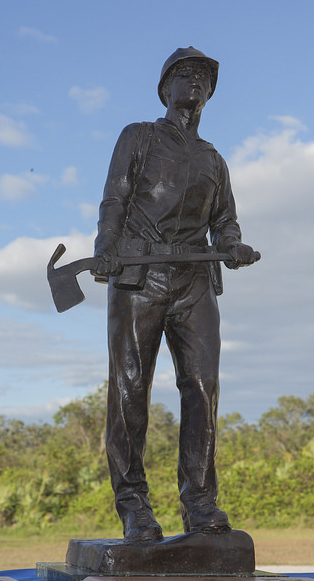By Kay Grinter
NASA’s John F. Kennedy Space Center
The multi-agency Prescribed Burn Working Group was presented with the prestigious 2017 Pulaski Award by the governing board of the National Interagency Fire Center (NIFC) in Boise, Idaho. The group includes representatives from NASA’s Kennedy Space Center, Cape Canaveral Air Force Station’s 45th Space Wing and the Merritt Island National Wildlife Refuge, recognized as the Spaceport Integration Team, and their partners with the Florida Forest Service and Brevard County Fire Rescue.
The Pulaski Award recognizes groups demonstrating outstanding performance in the areas of interagency collaboration, cooperation and coordination, as well as the safety of wildland firefighters or the American public during a wildfire, outstanding group performance in fire management and fire operations activities, outstanding performance on a wildland fire management project or activity and development of partnerships or communication tools.
The honor was given to the team in recognition of a unique government partnership at Kennedy Space Center, Cape Canaveral Air Force Station and the surrounding refuge lands as a model of success in wildland fire management. Kennedy was represented on the team by employees from Spaceport Integration and Services, under the direction of Nancy Bray. Spaceport Integration and Services is responsible for coordinating and integrating the prescribed burns on space center property with all the NASA programs and the commercial and government partners operating on the multi-user spaceport.
The U. S. Fish and Wildlife Service hosted the ceremony Nov. 1 at their headquarters building on the Merritt Island National Wildlife Refuge, combining it with the dedication of their memorial marker honoring two fallen firefighters who died fighting a wildfire on Kennedy property in 1981, a tragedy that lead to the establishment of a prescribed burn program to better manage the land and reduce the threat of future wildfires. A statue, the Pulaski Award will remain on display on the wildlife refuge for a year.
“It is great honor to receive the award because it recognizes the dedication of the men and women who work together to accomplish our fire management goals,” said Michael Good, assistant fire management officer for the Merritt Island National Wildlife Refuge and organizer of the event. “The high level of teamwork and collaboration that the Spaceport Integration Team members display should stand as a model for other fire management agencies to follow.”
The ceremony opened with the six-person uniformed FWS National Honor Guard presenting colors and symbolically placing firefighting tools at the inscribed granite marker, followed by the 2017 Pulaski Award plaque presentations. Kennedy Space Center Associate Director Kelvin Manning accepted the plaque on behalf of the center.
“It has been 36 years since the Ransom Road Fire occurred on June 8, 1981, which took the lives of Scott Maness and Beau Sauselein,” Good said. “The memorial was designed and built by local fire management staff to serve as a daily reminder of their sacrifice. On a personal note, I must say that dedicating this memorial has been the most satisfying accomplishment of my career. There is nothing more prideful than honoring your fallen brothers and sisters.”
Jon Wallace, deputy regional fire management coordinator for the U.S. Fish and Wildlife Service in Atlanta, praised the Spaceport Integration Team in his nomination letter for the award: “The success we realized in 2016 is due to our partners’ understanding that technology and nature can and should co-exist on an island off the east coast of Florida. Collectively, we can be proud that our efforts have resulted in thousands of acres of prescribed burns, and hundreds of acres of mechanical hazard fuel reduction projects, for the end goal of restoring native habitats for a threatened species, and protection of our neighbor’s homes and the nation’s space program infrastructure.
“Through the leadership of the Spaceport Integration Team,” he stated, “these treatments were scheduled and accomplished around 36 successful rocket launches.”






























